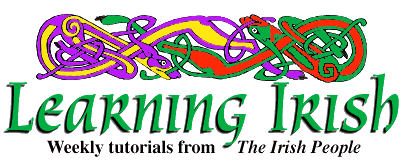
Irish Lesson 25
|
PRONUNCIATION REVIEW Three consonants whose pronunciation we can study together are "b, p, m". If a vowel nearest any of these in a word is "a, o, u", the consonant gets its broad sound. You make it by protruding the lips, then pronouncing the sound to resemble the corresponding English sound. Try: bád, buan (BOO-uhn), bac (bahk), bocht (bohk*t), bun (bun); blas (blahs), blúire (BLOO-ir-e), bradán (bruh-DAW*N), brón, brú (broo). pá, Pól, púdar (POO-duhr), paca (PAH-kuh), póca (POH-kuh), punt (poont); plab (plahb), pláta (PLAW*-tuh), prás (praw*s), próca (PROH-kuh). má, mór, muc (muk), maith (mah), mar (muhr), mol (muhl), mullóg (mu-LOHG), mná (muh-NAW*). Sometimes a slender vowel follows the broad consonant sound, and an "a, o, u" is placed between to indicate this. The result in pronunciation is a sound like that for the English "w" between consonant and vowel. Examples: bain (bwin), buidéal (bwi-DAY*L), buí (bwee), buile (BWIL-e), puinn (pwin), moil (mwil). You can see why this is so when you form the broad "b, p, m" and then change to the (i) or (ee) sound in the examples above. For the slender "b, p, m" sounds, bring the lips in close to the teeth and spread the lips slightly as if you were beginning to smile. Then pronounce the letters. Examples: béal (bay*l), bia (BEE-uh), blian (BLEE-in), bleachtaire (BLAK*-tuhr-e), breac (bir-RAK), bréan (BRAY*-uhn). pé (pay*), pian (PEE-uhn), pic (pik), plé, preab (pir-RAB), príosún (pree-SOON). mé (may*), milis (MIL-ish), mian (MEE-uhn), meil (mel). GRAMMAR With this lesson, we begin the past tense of verbs, so that you will be able to say, "I wrote a letter" or "He ate". At present, you know how to say "I was writing a letter" and "He was eating". Remember that the command to a single person is the simplest form of the verb. For example: Léigh (lay*), read. Scríobh é (shkreev ay*), write it. Ol é (ohl ay*), drink it. To form the past tense, merely use this command or imperative, but aspirate the initial consonant, if that is possible. If the imperative form begins with a vowel or an "f", you must put a (d) sound befor the verb. Here are examples: Bhain sé an cóta de (vwin shay* un KOH-tuh de), He took off his coat. Chuir mé ar an mbord é (k*ir may* er un mohrd ay*), I put it on the table. Dhíol tú é (yeel too ay*), You sold it. D'fhan sé (dahn shay*), He remained. Ghlan mé an fhuinneog (gluhn may* un in-YOHG), I cleaned the window. Léigh sí a leabhar (lay* shee uh LOU-wuhr), She read her book). Mhol mé an cailín (vwuhl may* uh kah-LEEN), I praised the girl. Nigh (ni) sé an carr, He washed the car. Phóg (fohg) sí a máthair (MAW*-hir), She kissed her mother. Rith siad amach (ri SHEE-uhd uh-MAHK*), They ran out. Sheas sé ann (has shay* oun), He stood there. Thóg sibh é (hohg shiv ay*), You took it. Next come examples for verbs beginning with vowels: D'alp sé é (dahlp shay* ay), He gulped it down. D'éist sé liom (day*sht shay* luhm) He listened to me. D'ith (di) siad é, They ate it. D'ol tú an bainne (dohl too un BAHN-ye), You drank the milk. D'ullmhaigh mé (DUL-vwee may*), I prepared. Go over these examples until you are able to read them quickly. Notice that initial "l, n, r" cannot be aspirated and so do not change from the imperative. In some cases, the consonants that can be aspirated are followed by other consonants that would make it difficult for a speaker to aspirate the first consonant. An example: Scríobh (shkreev) sé é, He wrote it. Try aspirating the "s" in "scríobh". You would have to say (huh-KREEV), which would be too difficult. The examples above give you a good idea of how to form the past tense of most of the verbs you know. You will not be able to form the past tense of the few irregular verbs yet. These you must learn separately, and we will have separate drills for these. "Tá" is one irregular verb whose past tense, "bhí", you already know. VOCABULARY caith, ag caitheamh (kah, uh KAH-huhv), throw, wear, spend buail, ag bualadh (BOO-il, uh BOO-luh), strike tuig, ag tuiscint (tig, uh TISH-kint), understand fan, ag fanacht (fahn, uh FAHN-uhk*t), wait creid, ag creidiúint (kred, uh kred-YOO-int), believe scuab, ag scuabadh (SKOO-uhb, uh SKOO-buh), sweep ceannaigh, ag ceannach (KAN-ee, uh KAN-uhk*), buy díol, ag díol (DEE-uhl, uh DEE-uhl), sell ól, ag ól (ohl, eg OHL), drink ith, ag ithe (i, eg I-he), eat DRILL The verbs above are put into the past tense like this: Chaith siad an leabhar (k*ah SHEE-uhd un LOU-uhr), They threw the book. Substitute "mé, tú, sé, sí, sibh (shiv)" for "siad" in this and the following sentences (do not substitute "sinn", we, yet): Bhuail siad an buachaill (BOO-uhk*-il), They struck the boy. Cheannaigh siad mórán rud (HAN-ee SHEE-uhd moh-RAW*N rud), they bought many things. Thuig siad an fear eile (hig SHEE-uhd un far EL-e), they understood the other man. D'ól siad gloine uisce (dohl SHEE-uhd GLIN-e ISH-ke), They drank a glass of water. Chreid siad an scéal (hyred SHEE-uhd un shkay*l), They believed the story. (Run the "h" and the "y" sounds together for the aspirated "c".) (c) 1997 The Irish People. May be reprinted with credit. |